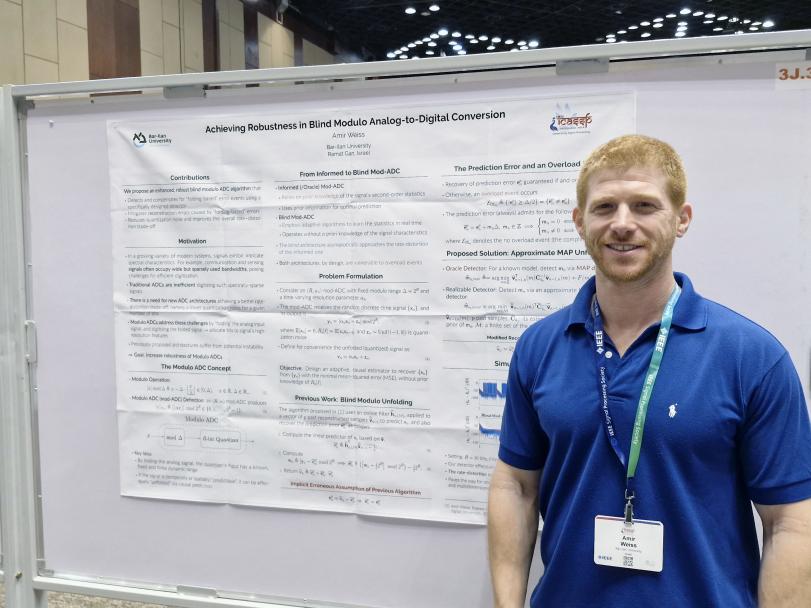Four New Papers for Dr. Amir Weiss

At an IEEE conference on signal processing held in Hyderabad, India, Dr. Weiss presented two papers in two separate poster sessions. A third paper was published in IEEE’s communications journal, and a fourth is due to be published in a journal on signal processing
April 2025 was a productive month for Dr. Amir Weiss. At the beginning of the month, his paper was published in the IEEE Open Journal of the Communications Society, one of the International Electrical and Electronics Engineers Association's journals on communications. The paper, RF Challenge: The Data-Driven Radio Frequency Signal Separation Challenge, explores separating RF signals using innovative deep learning-based methods.
Later this month, Dr. Weiss traveled to Hyderabad, India, where he attended ICASSP 2025, the premier and largest annual conference of the SPS (Signal Processing Society), the IEEE’s signal processing community. "This is the largest and most important conference for the signal processing community, and so far I have been fortunate to publish there and attend quite regularly since the middle of my doctorate," says Dr. Weiss. "These conferences are where you meet leading researchers in the scientific community, present ideas, and develop collaborations. This year I published two papers in two different poster sessions. I like this format, where you stand next to the poster and people come by, because unlike a lecture or discussion – it's a more flowing format. Only those who are interested stop by, and you adjust the rhythm to whoever is there, so the audience is already supportive and engaged. Both posters garnered plenty of interest, even more than I had expected, and positive feedback from faculty members at other universities in Israel, as well as from academics abroad."
One paper presented by Dr. Weiss, Achieving Robustness in Blind Modulo Analog-to-Digital Conversion, participated in a session on sampling theory. "The paper is concerned with improving an algorithm that I started working on during my post-doctorate, aimed at digitizing signals: converting an analog signal to a digital signal, that is, a signal represented by a finite number of bits. When digitizing, inherently, a certain distortion is introduced, because there's a limit to how precise you can be with a given number of bits, and the goal is to use the bits allocated to you to find a representation with as little distortion as possible," explains Dr. Weiss. "The current paper continues my research path, but through additional improvement of the algorithm, I have managed to find a way to represent the original signal in a more faithful and accurate way, with the same resources."
The second paper, Extremum Encoding for Joint Baseband Signal Compression and Time-Delay Estimation for Distributed Systems, participated in a session on advances in estimation and decoding for communications. "The paper explores joint compression and estimation of the time difference of arrival of signals, where the applicative motivation is localization with distributed systems. For example, when two sensors are located far apart from each other, they each receive the signal at a slightly different time, and they need to communicate with each other and perform calculations based on these signals," he explains.
Near the end of the month, Dr. Weiss was informed that another paper of his, an extended version of the paper on joint compression and time-delay estimation presented at the conference, was accepted for publication in the prestigious IEEE Transactions on Signal Processing journal. And if this piques your interest, Dr. Weiss is still looking for partners, graduate students with strong mathematical backgrounds. For more information, send Dr. Weiss a message.
Last Updated Date : 22/05/2025



